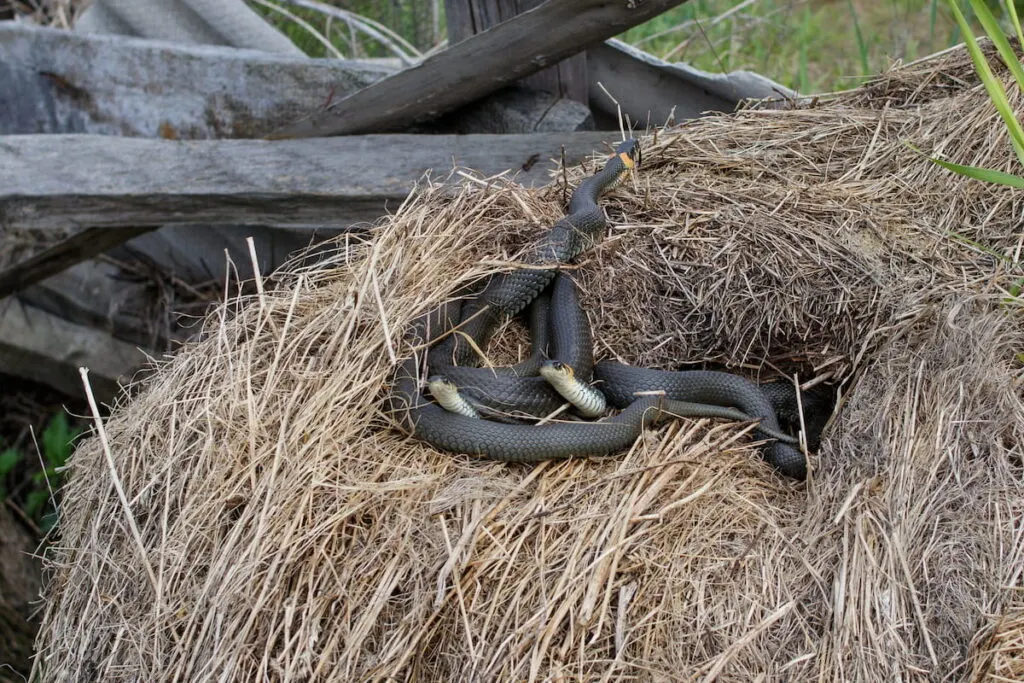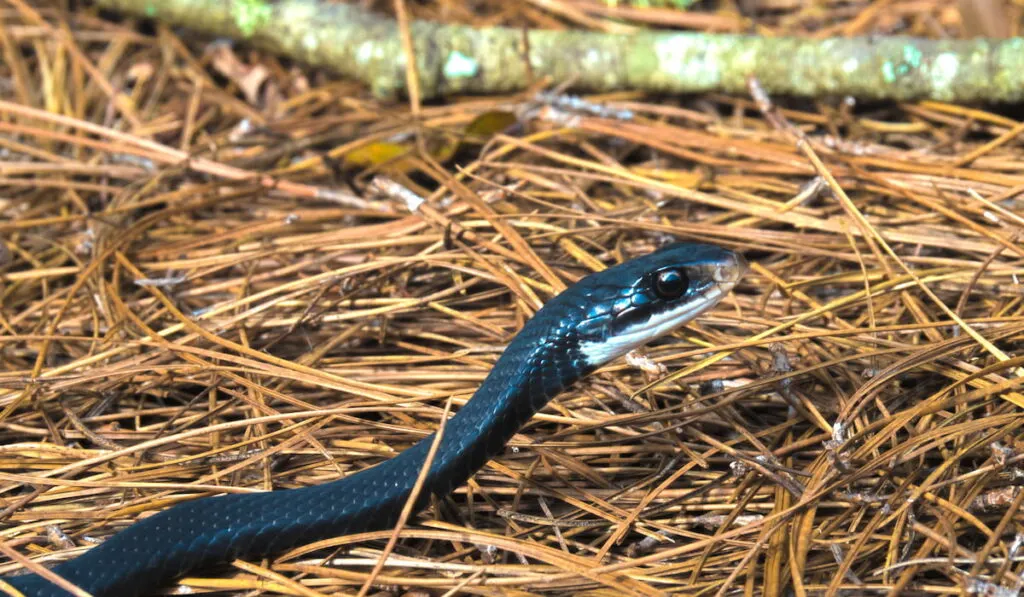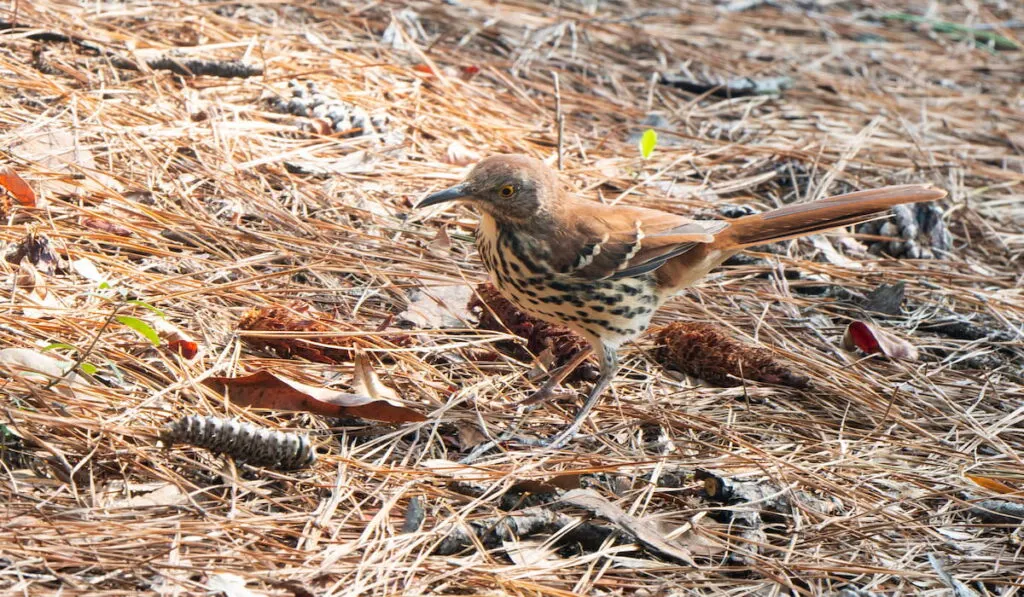Pine straw is an economical soil cover for gardens, but does it provide an inviting environment for snakes?
Does pine straw attract snakes?
Pine straw does attract snakes because it provides the coverage that’s ideal for nesting and hiding from would-be predators. Pine needles, especially when several inches long, increase the chances of snake infestations.

If you want to keep snakes away, you should avoid using pine straw or make sure that it’s cut short to make it harder for snakes to hide in. Shorter needles also make it easier for you or anyone else to spot snakes from farther away, reducing the odds of an unwanted encounter.
People who want to use pine straw in their gardens or as mulch in their yards must be vigilant to keep snakes out and avoid getting bitten.
The way you manage your yard and where the pine straw mulch is will help manage any snake problems and keep you and your pets safe.

Table of Contents
Why Do Snakes Love Pine Straw?
Snakes love hiding in pine straw, whether they’re in someone’s backyard or out in the wild.
Pine straw mulch mimics many snakes’ natural habitats. They spend their lives on the floor of pine forests, where they burrow into piles of pine straw to sleep, hunt, lay eggs, or hide.
Here are some of the reasons why snakes are drawn to pine straw:
Reliable Water Source
Snakes don’t need a lot of water to survive, but it’s something every animal needs.
In forests, snakes prefer not to expose themselves near ponds or lakes if they don’t have to. Even then, they hide in tall grass wherever possible.

Snakes love pine straws because water droplets collect in the straws and can last for days before they dry, giving snakes plenty of water without having to move as much.
Now, imagine your pine straw as freshly watered after the sprinklers turn off. Snakes are going to think that they’ve hit the jackpot when they slither into your pine straw mulch.
Insects
Snakes aren’t the only things that love to hide in pine needles.
Plenty of bugs, rodents, and other small animals will make their way into the mulch if they’re long enough and there is a big enough pile of it.

The amount of food and the ability to eat in privacy attract snakes to pine straws.
If you notice that your pine straw is full of insects or see any mice running around in it, you should act before snakes eventually follow.
Shade

Snakes are always on the hunt for shade wherever they go.
Shade is the reason you’ll find snakes under benches, in sheds, in between rocks, and in woodpiles. They’re always trying to get out of the sun to manage their body temperatures.
Shade is also a terrific cover against predators. So, a nice big pile of pine straw may be the perfect shady spot a snake is looking for when it needs to hide.
To prevent snakes from getting into your pine straw, either buy pine straw mulch that’s cut shorter or cut it yourself at home.
Keeping Snakes Out of Your Pine Straw
To some people, the risk of snakes in their pine straw is low when compared to how much they love the look of pine straw spread out across flower beds, gardens, and under trees.
The risk of snake bites is relatively low, and, in many cases, people can manage the situation when they come across a snake or two.
It’s true; most snakes will leave when they hear a human coming.
However, there are times and certain areas where a copperhead or some other poisonous snake known to bite people more frequently can get into your pine straw mulch or extra pine needles in a neglected yard.
These poisonous snakes are more cause for concern, which is why managing your pine straw is important.
To keep snakes out of your yard, you’re going to want to do your best to eliminate or reduce the reasons why snakes love going there in the first place.
Do what you can to prevent too many insects from getting into the straw, and lay traps if you spot any mice darting in and out of your mulch.
Likewise, cutting the pine straw shorter and keeping it spread thinly enough to avoid water pooling after rain or watering will help cut off any potential water source for snakes.
Do Snake Repellants Work?
If you see snakes in your yard, it’s enough to make most people worried.
No one wants to step on a snake when they’re walking around their garden. People who have small pets or children are understandably worried about the chances of a snake biting them.
Usually, people go online looking for snake repellants that will drive them away. These products typically contain sulfur or the ingredient in mothballs, naphthalene, and promise to eliminate snake issues for good.
But do they work?

Unfortunately, most of these products fail to deliver on their promise to keep snakes away. Putting them out in your yard can also be dangerous for small children, pets, birds, and other curious animals who would take a bite out of them.
The best way to keep your yard or garden free of snakes is to prevent them from coming in the first place: Keep your yard neat and eliminate places for snakes to hide.
Think like a snake when you walk through your property and zero in on potential hiding spots. Make sure to cut your grass short, shore up any cracks under sheds or your house, and get rid of woodpiles, junk piles, and large piles of pine straw.
Avoid keeping a birdbath or any other water source in your yard. Manage insects and any rodent infestations quickly.
Final Thoughts
If you do spot a snake in your yard, don’t pray for it to leave or wait it out. The snake, if it feels comfortable, will start to nest there and come back time and again if it’s a safe place for it to live.
Call your local pest removal agents to remove the snake rather than try to do it yourself. This will prevent any unwanted bites and won’t harm the snake.
